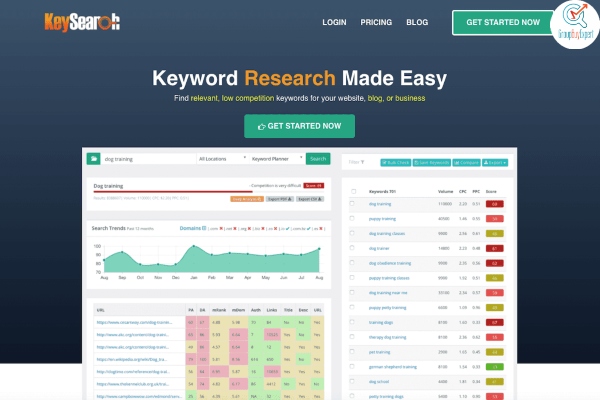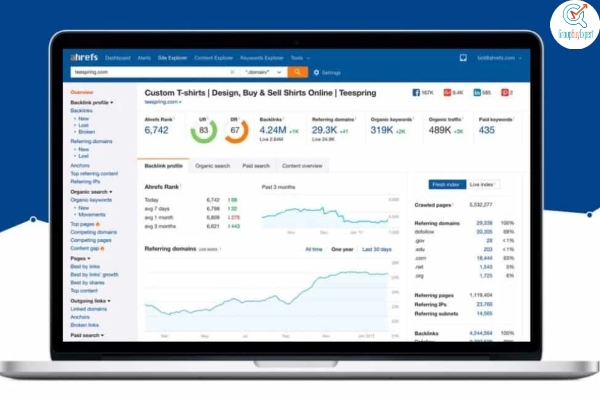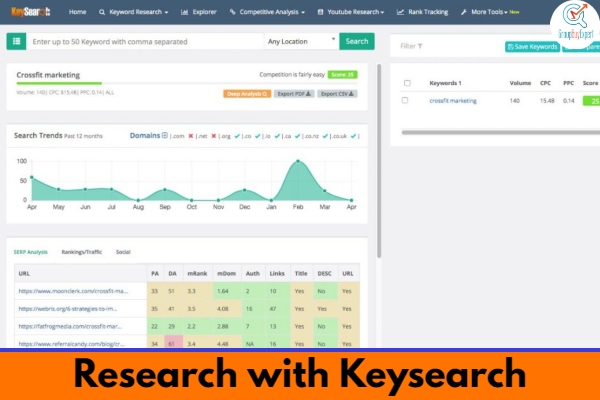
When it comes to performing keyword research, having the appropriate tools is essential for the success of your website, blog, or business. Currently, two widely used tools are Keysearch and Ahrefs.
Both profess to provide excellent keyword results, but which one truly excels? This blog post will compare Keysearch and Ahrefs to determine which tool suits your keyword research requirements. So, let's begin!
About Keysearch

Unlocking the Power of Keysearch: Your Go-To SEO Tool
Keyword research is a crucial element of a prosperous online venture or website. This process involves locating pertinent, less competitive keywords that attract traffic to your site. This is where keyword research tools step in, and two of the most favoured tools in this arena are Keysearch and Ahrefs.
This robust keyword research tool is tailored for bloggers, publishers, SEO experts, and online entrepreneurs. It furnishes a variety of features to assist users in discovering low-competition keywords, pinpointing profitable niches, and monitoring their search engine rankings. Keysearch boasts a user-friendly interface, streamlining keyword discovery for users.
Keysearch feature highlights
Keysearch is a robust keyword research tool equipped with a wide array of functionalities aimed at simplifying and enhancing the keyword research process. Here are some of the primary attributes of Keysearch:
Keyword Difficulty Assessment
Keysearch thoroughly evaluates keyword difficulty, enabling users to ascertain which keywords are more attainable in ranking. This feature considers factors such as domain authority, page authority, backlinks, and other on-page elements that influence keyword rankings.
Comprehensive Keyword Exploration
With Keysearch, you can conduct extensive keyword research for your website, blog, or business. You can generate keyword suggestions based on your initial keyword, and the tool will furnish you with a list of related keywords to target.
Competitive Examination
Keysearch also includes a competitive analysis function that empowers you to scrutinise your competitors' websites and pinpoint the keywords they have achieved rankings for. This valuable information offers insights into your competition, which can be employed to fine-tune your SEO strategy.
Rank Monitoring
Keysearch incorporates a rank-tracking feature, allowing you to keep tabs on your website's performance with specific keywords. This enables you to monitor your progress and make necessary adjustments to your strategy.
Backlink Analysis
Keysearch provides an extensive backlink analysis tool for assessing your website's backlink profile and identifying areas for enhancement. This feature can help you identify harmful links and disavow them to enhance your website's search engine rankings.
Pros & Cons
Pros:
Comprehensive Features: Keysearch offers a wide range of tools for keyword research, competitive analysis, rank tracking, and backlink analysis in one platform.
Keyword Difficulty Analysis: Provides in-depth insights into keyword competitiveness, aiding in smarter keyword selection.
Competitive Analysis: This allows you to analyse your competitors' keyword strategies.
Rank Tracking: Helps monitor keyword rankings and measure SEO progress.
Backlink Analysis: A tool to assess and improve your website's backlink profile.
User-Friendly: The interface is user-friendly, making it accessible for beginners and experienced SEO professionals.
Cons:
Subscription Cost: Keysearch requires a subscription, which may need to be more budget-friendly for small businesses or individuals.
Learning Curve: While user-friendly, it still takes time to learn and fully utilize all its features.
Limited Free Version: The free trial version has limitations and may not provide access to all features.
About Ahrefs

Discovering Ahrefs: Your Path to SEO Excellence
Ahrefs is an all-encompassing SEO tool that goes beyond mere keyword research. It gives users extensive insights into backlinks, website traffic, and competitive analysis. Ahrefs surpasses Keysearch in terms of sophistication and thoroughly examines keywords and competitor research.
In essence, both Keysearch and Ahrefs prove effective for keyword research, yet their spectrum of features differs in complexity and comprehensiveness. The choice between the two hinges on the specific requirements of your business or website.
Ahrefs feature highlights
Ahrefs is a robust SEO tool that provides many functions to enhance your search engine rankings and maintain a competitive edge. Here are some of the key attributes that contribute to Ahrefs' popularity among marketers and SEO experts:
Site Explorer
Ahrefs' Site Explorer feature gives you a comprehensive overview of any website's backlink profile. This includes information on the number of backlinks, referring domains, anchor text usage, and more.
Keyword Explorer
Utilising Ahrefs' Keyword Explorer, you can uncover fresh keyword opportunities, access search volume data, and evaluate competition levels for specific keywords.
Besides, Ahrefs' Content Explorer aids in the discovery of highly popular content within your niche. It can also generate content ideas, assess backlinks, and monitor social media shares.
Rank Tracker
Ahrefs' Rank Tracker enables you to monitor your website's search engine rankings for specific keywords over time. Additionally, you can monitor your competitors' rankings and make performance comparisons.
Site Audit & Alerts
Ahrefs' Site Audit function assists in identifying technical SEO issues that might impede your website's performance. It provides actionable recommendations for resolving these issues.
Also, the Alerts feature enables you to set up notifications for particular keywords, mentions of your brand, or backlinks. This facilitates the maintenance of your online presence and swift responses to potential concerns.
Pros & Cons
Pros:
Comprehensive SEO Tools: Ahrefs offers many powerful SEO tools covering backlink analysis, keyword research, and more.
Accurate Data: It provides highly accurate and up-to-date data, especially regarding backlink profiles.
Competitor Analysis: Ahrefs excels in competitor analysis, helping you understand your competition's strategies.
User-Friendly Interface: The user-friendly platform makes it accessible to beginners and experts.
Site Audit: Its site audit feature helps identify and resolve technical SEO issues effectively.
Cons:
Costly: Ahrefs can be relatively expensive, which may need to be more budget-friendly for small businesses.
Learning Curve: While user-friendly, some of its advanced features may have a learning curve for beginners.
Limited Keyword Tracking: Your subscription plan may limit the number of keywords you can track.
Related article: kwfinder vs ahrefs
Keysearch Vs Ahrefs: Cost Comparison

Counting the Costs: Keysearch vs. Ahrefs Pricing Comparison
When considering the pricing of Keysearch and Ahrefs, there exists a notable contrast between the two. Keysearch is unquestionably more cost-effective, commencing with plans as low as $17 per month.
This proves advantageous for bloggers and small-scale business proprietors with limited financial resources to allocate towards pricey tools. Additionally, Keysearch offers a complimentary trial period, enabling users to explore its features prior to committing to a paid subscription.
Conversely, Ahrefs is notably more expensive, commencing with plans at $99 per month. Nevertheless, Ahrefs does provide a 7-day trial for a mere $7, allowing individuals to assess the tool's suitability before making a financial commitment. It is important to acknowledge that Ahrefs offers more extensive features compared to Keysearch, although not everyone may require these advanced capabilities.
Ultimately, the decision regarding cost boils down to your specific requirements and financial constraints. If you seek an affordable option with robust functionalities, Keysearch is the preferable choice. However, if you possess a larger budget and necessitate more comprehensive insights, Ahrefs may warrant the investment.
How to do Keyword Research with Keysearch

Mastering Keyword Research with Keysearch: A Step-by-Step Guide
Keysearch is an efficient tool for conducting keyword research, offering users a user-friendly interface for discovering profitable keywords. This tool provides a range of features, including in-depth keyword analysis, competitor investigation, backlink assessment, and rank tracking. In this section, we will explore the process of conducting keyword research using Keysearch.
Select a primary keyword
The initial step in keyword research involves selecting a primary keyword for which you aim to rank. This keyword should be relevant to your niche or business. For example, if you operate a health blog, your primary keyword could be "healthy lifestyle."
Utilize the Keyword Explorer tool
After choosing your primary keyword, input it into Keysearch's Keyword Explorer tool. The tool will present a list of related keywords that can be utilized for your website. You can filter these results based on search volume, CPC, and other criteria to identify the most lucrative keywords for your business.
Evaluate the competition
Once you've identified potential keywords, assessing the competition associated with them is crucial. Keysearch allows you to examine the top 10 search results for any keyword and gauge the difficulty of ranking for that particular keyword. The tool provides metrics such as Domain Authority, Page Authority, and Backlinks for each competitor, aiding in your decision-making process regarding whether targeting that keyword is worthwhile.
Fine-tune your search
Once you've pinpointed the keywords you wish to target, you can use Keysearch's filters to refine your search further. You can include negative keywords, restrict search results by language or location, and establish maximum or minimum values for search volume and CPC.
How to do Keyword Research with Ahrefs

Caption: "Keyword Research with Ahrefs Demystified
Ahrefs stands out as one of the most widely used and comprehensive tools for conducting keyword research. Here's a guide on how to utilize Ahrefs for keyword research effectively:
Input a Seed Keyword
Commence your keyword research by entering a seed keyword or phrase into the search box within Ahrefs' keyword explorer. This initial step will provide you with insights into the potential search volume and the level of competition associated with that keyword.
Examine the Results
Ahrefs will then furnish you with a list of related keywords and crucial data such as search volume, difficulty score, and other relevant metrics. These metrics serve as valuable indicators to help you narrow down your selection of potential keywords.
Assess Keyword Difficulty
Ahrefs' keyword difficulty score proves particularly valuable in gauging whether a keyword is worth pursuing. A higher difficulty score indicates a more challenging path to ranking for that keyword. Therefore, prioritise keywords with a low difficulty score and a substantial search volume for your targeting efforts.
Explore the SERP
Ahrefs also features a SERP analysis tool that lets you observe which websites currently occupy top positions for a specific keyword. This insightful feature offers guidance on the type of content you should develop to compete for that keyword effectively.
Fine-Tune Your Selection
Lastly, employ Ahrefs' filtering options to refine your list of potential keywords further. You can apply filters based on search volume, difficulty, and other metrics to pinpoint the ideal keywords for your website or business.
Read more: ubersuggest vs ahrefs
Comparison Table
Feature | Keysearch | Ahrefs |
Overview | Affordable keyword research tool | All-in-one SEO tool |
Keyword Research | - Keyword suggestions - Keyword difficulty - Import and track keywords | - Extensive keyword data - Keyword ideas - Historical data |
Backlink Analysis | Basic analysis | Comprehensive analysis |
Competitor Analysis | Basic overview of competitors | Advanced competitor analysis |
Rank Tracking | Basic rank tracking | Detailed rank tracking |
Content Research | Basic content ideas | Content explorer, gap analysis |
Pricing | Affordable plans | Higher pricing tiers |
User-Friendliness | User-friendly interface | Steeper learning curve |
FAQs
Can Keysearch track keyword rankings like Ahrefs?
Yes, Keysearch provides a keyword rank tracking feature that allows you to monitor your website's keyword rankings in search engine results pages (SERPs), similar to Ahrefs.
Does Ahrefs offer more in-depth backlink analysis compared to Keysearch?
Yes, Ahrefs is renowned for its backlink analysis capabilities, offering a comprehensive view of backlinks, referring domains, and other link-related data. Keysearch also provides backlink analysis but may not be as detailed as Ahrefs.
Which tool is better for competitor analysis: Keysearch or Ahrefs?
Ahrefs is often preferred for competitor analysis due to its extensive data on competitors' websites, backlinks, and content. Keysearch can still be useful for basic competitor research.
Can I use Keysearch and Ahrefs together for SEO purposes?
Yes, some SEO professionals use both Keysearch and Ahrefs in conjunction to leverage the strengths of each tool. For example, you can use Keysearch for keyword research and Ahrefs for backlink analysis.
Do Keysearch and Ahrefs offer free trials?
Both Keysearch and Ahrefs offer free trials or limited-access plans, allowing users to explore their features before committing to a paid subscription.
Which tool is suitable for beginners in SEO: Keysearch or Ahrefs?
Keysearch is often considered more user-friendly and budget-friendly, making it a good choice for beginners in SEO. Ahrefs, while powerful, may have a steeper learning curve and higher pricing.
Conclusion
In the battle of Keysearch vs Ahrefs, both tools offer unique advantages for SEO enthusiasts. Keysearch is a cost-effective option suitable for beginners, while Ahrefs provides comprehensive features for advanced users. Choose the one that aligns with your SEO goals and budget to boost your online presence.
Thanks for reading!
Related Post:


